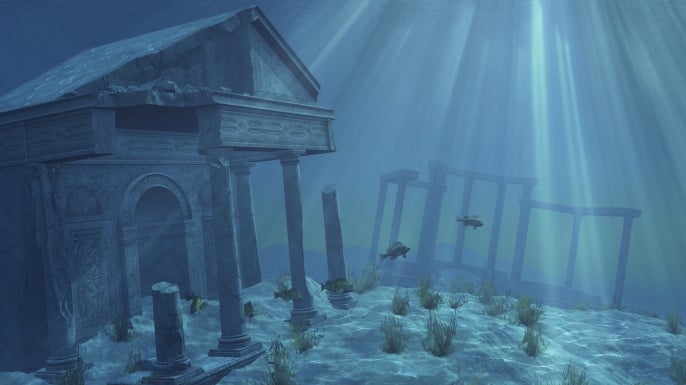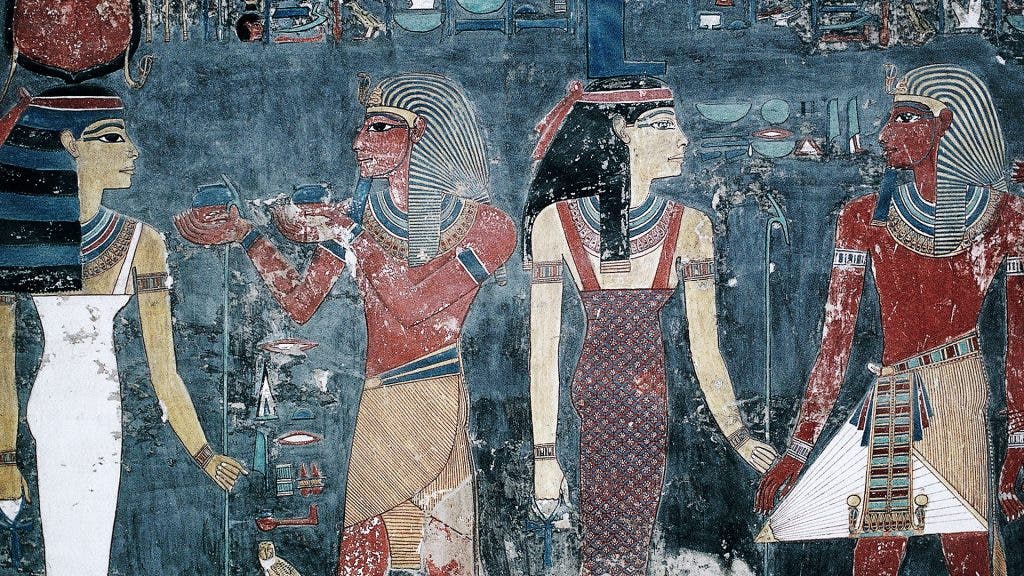Around 360 B.C., the ancient Greek philosopher Plato described a powerful, advanced island civilization that existed 9,000 years before his time. In his Socratic dialogues called Timaeus and Critias, he describes this civilization, located beyond the Pillars of Hercules (modern-day Strait of Gibraltar) as a vast, wealthy empire with glorious architecture, advanced technology, and a strong military.
This great civilization, according to the dialogues, was ultimately destroyed in a cataclysmic event after societal moral decay and it sank into the ocean around 9.600 B.C. Is the story of Atlantis based on any fact? Below are six of the most prominent theories about the account.
1. Atlantis was a mid-Atlantic continent that suddenly sunk into the ocean.
The idea that Atlantis was an actual historical place, and not just a legend invented by Plato, didn’t surface until the late 19th century. In his 1882 book, Atlantis, the Antediluvian World, the writer Ignatius Donnelly argued the accomplishments of the ancient world (such as metallurgy, language and agriculture) must have been handed down by an earlier advanced civilization, as the ancients weren’t sophisticated enough to develop these advances on their own.
Assuming the Atlantic Ocean was only a few hundred feet deep, Donnelly described a continent flooded by shifting ocean waters that sank in the exact location Plato said it did: in the Atlantic Ocean just outside the “Pillars of Hercules,” the two rocks that mark the entrance to the Straits of Gibraltar. Long after modern oceanography and a greater understanding of plate tectonics poked holes in his shifting-waters thesis, some continue to cling to Donnelly’s theory, mostly due to its adherence to Plato’s placement of Atlantis in the mid-Atlantic.
2. Atlantis was swallowed up by the Bermuda Triangle.
Inspired by Donnelly, many later writers expanded on his theories and added their own speculations as to where Atlantis may have been. One of these writers was Charles Berlitz, grandson of the founder of the well-known language schools, and author of many books on paranormal phenomena. In the 1970s, Berlitz claimed Atlantis was a real continent located off the Bahamas that had fallen victim to the notorious “Bermuda Triangle,” a region of the Atlantic where a number of ships had supposedly disappeared under mysterious circumstances. Supporters of this theory point to the discovery of what look like man-made walls and streets found off the coast of Bimini, although scientists have evaluated these structures and found them to be natural beach-rock formations.
3. Atlantis was Antarctica.
Another theory—that Atlantis was actually a much more temperate version of what is now Antarctica—is based on the work of Charles Hapgood, whose 1958 book Earth’s Shifting Crust featured a foreword by Albert Einstein. According to Hapgood, around 12,000 years ago the Earth’s crust shifted, displacing the continent that became Antarctica from a location much further north than it is today. This more temperate continent was home to an advanced civilization, but the sudden shift to its current frigid location doomed the civilization’s inhabitants—the Atlanteans—and their magnificent city was buried under layers of ice. Hapgood’s theory surfaced before the scientific world gained a full understanding of plate tectonics, which largely relegated his “shifting crust” idea to the fringes of Atlantean beliefs.
4. The story of Atlantis was a mythical retelling of the Black Sea Flood.
This theory presumes Atlantis itself was fictional, but the story of its demise was inspired by an actual historical event: the breaching of the Bosporus by the Mediterranean Sea and subsequent flooding of the Black Sea, around 5600 B.C. At the time, the Black Sea was a freshwater lake half its current size. The flooding inundated civilizations known to flourish along its shore with hundreds of feet of seawater in a short period of time (perhaps less than a year). As inhabitants of the region scattered, they spread tales of the deluge and may have led—thousands of years later—to Plato’s account of Atlantis.
5. Atlantis is the story of the Minoan civilization, which flourished in the Greek islands circa 2500-1600 B.C.
One of the more recent Atlantean theories concerns the civilization that flourished on the Greek islands of Crete and Thera (now Santorini) more than 4,000 years ago: the Minoans, named for the legendary King Minos. Believed to be Europe’s first great civilization, the Minoans built splendid palaces, constructed paved roads and were the first Europeans to use a written language (Linear A). At the height of their power, however, the Minoans suddenly disappeared from history—an enduring mystery that has fueled belief in a link between this great, doomed civilization and Plato’s Atlantis. Historians believe around 1600 B.C., a massive earthquake shook the volcanic island of Thera, triggering an eruption that spewed 10 million tons of rock, ash and gas into the atmosphere. Tsunamis that followed the eruption were large enough to wipe out Minoan cities throughout the region, devastation that may have made the Minoans vulnerable to invaders from the Greek mainland.
Was Atlantis Located in Ancient Greece?
6. Atlantis didn’t exist at all—Plato invented it.
Most historians and scientists throughout history have come to the conclusion that Plato’s account of the lost kingdom of Atlantis was fictional. According to this argument, the Greek philosopher invented Atlantis as his vision of an ideal civilization and intended the story of its demise to be a cautionary tale of the gods punishing human hubris. No written records of Atlantis exist outside of Plato’s dialogues, including in any of the numerous other texts that survive from ancient Greece. Furthermore, despite modern advances in oceanography and ocean-floor mapping, no trace of such a sunken civilization has ever been found.



